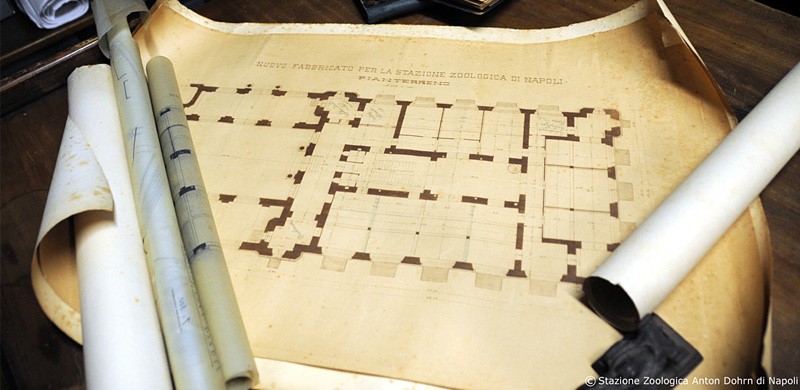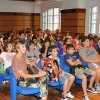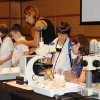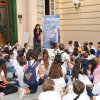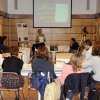 Tenders and Job Opportunities
Tenders and Job Opportunities Tenders and contracts
Tenders and contracts Advice of pre-information
Advice of pre-information ENGLISH
ENGLISH Pages
Pages
Pages
Historical Archives
Staff
Alessandra Passariello
Andrea Travaglini
Contacts
Tel. +39 081 5833 274
e-mail: archivio.cape(at)szn.it
Contacts - Research Services
Grant and Innovation Office
Tel. +39 081 5833367
e-mail: gio(at)szn.it
Scientific Outreach
The Stazione Zoologica is also dedicated to the development of training programs, dissemination activities and promotion of the public awareness of the importance of marine biodiversity conservation. These activities are carried out either through the Public Aquarium, the centre for research on sea turtles and the Museum on marine biodiversity and evolution and the largest marine library in europe. The researchers of the Aquarium are also involved in research projects aimed at the protection, rescue and rehabilitation of large marine vertebrates. The Stazione Zoologica performs outreach activities designed to make everyone aware of the importance of enhancing the natural heritage of the Mediterranean and its habitats.
The Stazione Zoologica, since its foundation, has promoted, organized and hosted cultural events, open to the public, and based on the combination of Science and Art from different perspectives. The Aquarium, the constituting Museum of Biology and Evolution of marine organisms and the Marine Library are the evidences of this vocation. In 2008 the Stazione Zoologica created Committee for Science and Society aimed at developing a forum and opportunities for the communication and discussion related to the Biological Sciences to the widest audience.
Committee for Scientific Outreach
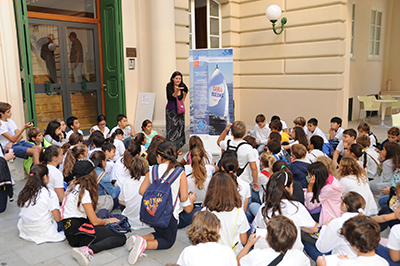
Il Comitato per la promozione della Divulgazione Scientifica ‐ Outreach fa riferimento all’Area di Terza Missione e ha il compito di coadiuvare le attività dell’Area di Terza Missione dell’Amministrazione e contribuisce alle attività dell’Ufficio di Disseminazione e Divulgazione per quel che riguarda la promozione della divulgazione scientifica e il Public engagement.
In particolare il CDS:
1. contribuisce alle attività di Public engagement (PE) per la promozione e la divulgazione dei risultati della ricerca attraverso la produzione di beni pubblici di natura sociale, educativa e culturale;
2. supporta la realizzazione delle iniziative individuali libere e delle attività di PE previste a livello di progetti di ricerca;
3. contribuisce all’elaborazione del programma annuale delle attività di divulgazione e PE della Stazione Zoologica con la relativa previsione di budget redatto dall’Ufficio di Disseminazione e Divulgazione, da proporre al Direttore ed al Presidente, che lo presenta nella versione finale al Consiglio di Amministrazione.
Il CDS è composto dai coordinatori/responsabili delle strutture aperte al Pubblico dell’Ente, da un rappresentante per ogni Dipartimento eletto tra il personale di ruolo, un rappresentante individuato ed eletto tra i dottorandi e i postdoc, un’unità di personale amministrativo con funzioni di segreteria.
Il Comitato può essere coadiuvato da ricercatori e professionisti esterni che possano contribuire alla comunicazione ed alla realizzazione delle attività intraprese.
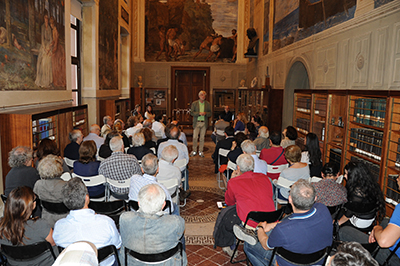 Dott.ssa Claudia Gili (Coordinator)
Dott.ssa Claudia Gili (Coordinator)
Stazione Zoologica and Schools
The Stazione Zoologica is internationally renowned for the expertise and the results of research in the marine environment and has always seen the public involvement as crucial. The research conducted at the SZN addresses the most important social challenges involving the sea. The primary objective of the activities SZN in the future will be to raise public awareness with the aim of improving the connection between science and citizens.
Researchers will have to make citizens understand what is happening in their laboratories and to keep them informed on the results of research and ongoing projects. With dedicated programs for training, the SZN improves the educational process of children of primary and secondary classes and increases their interest in science and technology, so they can become the researchers of tomorrow, and contribute to a science-literate society.
For further information please consult our Calendar and follow the activities of our Committee for Scientific Outreach
Museum of Marine Biology and Evolution for children
In Progress
Science school for children
Discovering Science WITH Scientists
The Zoological Station Anton Dohrn is internationally renowned for the expertise and the results of research on marine life and the public has been always involved. It is important to educate young people to respect the marine biodiversity and the habitats and ecosystems around us, especially at sea. The researchers of the SZN are permanently involved in this mission. The SZN improves the education of children of primary and secondary schools with dedicated training programs in order to increase their interest in science and technology, so as to become the researchers of tomorrow, and to contribute to a science-literate society.
The Aquarium and the Sea Turtle Research Centre, are the primary tools to transfer this knowledge and passion to young children, and to strengthen their environmental education, offering at once culture, science education and entertainment.
Photogallery
Cultural Association
No profit organizations, cultural associations and charities support Stazione Zoologica and participate in the accomplishment of its objectives. In particular, these associations protect, promote, and enhance the artistic and historical heritage, scientific research, education, and dissemination activities related to Stazione Zoologica.
In addition, these activities promote the connection with students and researchers who worked in the past at Stazione Zoologica (Ex Alumni) and stimulate the participation to scientific associations in the fields of interests of Stazione Zoologica.
Press Release
Inaugurazione anno della ricerca 2019
Scoperto il gene del sesso delle Diatomee
Thiolava veneris nella top ten delle nuove specie scoperte
Press Release - Un Nuovo Cluster Tecnologico a Napoli
Press Release -Differenze Genomiche
How a 700-million-year-old DNA glitch could explain why humans have limbs
Press Release - WORKSHOP INNOVATION FOR A SUSTAINABLE OCEAN ECONOMY
Press Release - #GenerAzioneMare
Press Release - Ocean Acidification Day
Press Release - I Capelli di Venere
Press Release - Campagna Jairo-Mediterraneo
Press Release - SKELETONEMA MARINOI
Press release - I vetrini di Boveri tornano a Napoli
Press release - Studio sulla Posidonia Oceanica
Press release - An ecosystem-based deep-ocean strategy (13 febbraio 2017)
Abissi come l'Antartide "Devono essere tutelati" - La PREALPINA
Il Mare Profonod per Unire i Popoli - l'Unità
Press Release Marine Turtles Research Centre Opening - Portici (January 20, 2017)
Scienziati di chiara fama e nuovi progetti, i “vents” di Ischia sono un riferimento mondiale - QuiIschia
Pristine Seas, così National Geographic convince gli Stati a salvare gli ultimi paradisi negli oceani - QuiIschia
Sorpresa nel Golfo di Napoli, trovata un'ostrica gigante - La Repubblica Napoli
Ostrica gigante e centenaria nel Golfo di Napoli - Corriere del Mezzogiorno
Nel golfo di Napoi un'ostrica gigante - ANSA Campania
Le Tartarughe tornano libere - Metro
Tartarughe a Ostia - Salvate dalle reti tornano a casa - Il Messaggero Cronaca di Roma
Ritornano nel "loro" mare le tartarughe Caretta - Il Tempo 9 giugno 2016
Torneranno in mare due tartarughe ferite - Il Tempo 8 giugno 2016
Festa a Battipaglia: le tartarughe Omero, Babason, Alessandra e Gonzala tornano in mare - La Repubblica Napoli
Su "Scientific Reports" l'alga invisibile che minaccia i ricci della Gaiola - La Repubblica Napoli
La ricchezza dimenticata delle acque profonde - Origami de La Stampa
Eni Award Lectures, lezione sul futuro dei mari siciliani - See more
Il Ritorno di Agata Christie, la tartaruga marina che ama la Campania - La Repubblica
Due Tartarughe Caretta caretta tornano in mare: munite di GPS - Il Mattino
Biologi marini al capezzale del Mediterraneo invaso da "specie aliene" che arrivano dal canale di Suez - Il Mattino
Prosegue l'Euromarine Workshop, protagoniste anche le specie aliene delle Isole Flegree - Qui Ischia
Specie aliene nei nostri mari, da Ischia il campanello d'allarme - La Repubblica
Mille metri sotto il mare, un robot a caccia di rifiuti nel Golfo di Napoli - Corriere del Mezzogiorno
SCIENZA, SU ‘NATURE’ STUDIO DELLO STAZIONE ZOOLOGICA DOHRN -OmniNapoli
Read More
Su Nature lo studio della Stazione Zoologica Anton Dohrn -Il Mattino
Read More
"Antenne in mare per controllare il Golfo" - Corriere del Mezzogiorno
Read More
"Dohrn, la Pompei del mare" - Corriere del Mezzogiorno
Read More
Il ministro Giannini "Stazione Dohrn, è come la Pompei degli acquari." - Mattino
Read More
Giannini alla Dohrn. "Questa è la Pompei degli acquari" - Repubblica
Read More
Arriva il Ministro, tensione con gli studenti - ROMA
Read More
Cnr: virus e fitoplancton contrastano il riscaldamento globale - R.it - Ambiente
Read More
Campania - Osservatorio del Mare, 11 partner istituzionali impegnati nel monitoraggio, protezione e valorizzazione del territorio - StabiaChannel.it
Read More
Nasce l'Osservatorio del Mare e del Litorale Costiero: "Un modello di cooperazione" - NAPOLITODAY.IT
Read More
Osservatorio del Mare e del Litorale Costiero istituito in Campania - L'INFORMATORE NAVALE
Read More
Presentato l'Osservatorio del Mare - Julienews.it
Read More
Osservatorio del Mare e del Litorale Costiero istituito in Campania - ilMetropolitano.it
Read More
Nasce l'Osservatorio del mare e del litorale costiero - ILMATTINO.it
Read More
Istituzioni e centri ricerca insieme per Osservatorio Mare - ANSA.IT
Read More
Un Centro ricerche e un Turtle point nell'ex Macello - la Repubblica.it
Read More
Napoli - Il Museo del Mare nella Casina del Boschetto
Watch the Video
Nella Casina del Boschetto nascerà il Museo del Mare - video.corrieredelmezzogiorno.corriere.it
Watch the Video
Comune, la Casina del Boschetto andrà alla stazione zoologica Anton Dohrn - corrieredelmezzogiorno.corriere.it
Read More
La Casina del Boschetto della Villa Comunale in gestione alla Stazione Zoologica Anton Dohrn - www.vivere.napoli.it
Read More
Nella Casina del Boschetto nascerà il Museo del Mare - www.vivere.napoli.it
Read More
Casina nel Boschetto, da Ex circolo della Stampa a Museo del Mare, intesa tra Comune e Stazione Dohrn - www.napolipost.com
Read More
La Casina del Boschetto - www.napoli.com
Read More
Napoli. La casina del boschetto tornerà a vivere col Museo del Mare - www.ilmattino.it
Read More
Un noto edificio storico di Napoli diventerà Museo del Mare - www.vesuviolive.it
Read More
La ciclo-staffetta Mesothalassia arriva alla Stazione Zoologica - www.comunicareilsociale.com
Read More
La ciclo-staffetta Mesothalassia alla Stazione Anton Dohrn - corrieredelmezzogiorno.corriere.it
Read More
Mesothalassia, la ciclo-staffetta ecologica fa tappa a Napoli - www.campaniasuweb.it
Read More
La ciclo-staffetta ecologica Mesothalassia arriva MARTEDì 7 luglio alla Stazione Zoologica - www.lastampadelmezzogiorno.it
Read More
L’ex Circolo della Stampa diventerà Museo del Mare, si recupera la Casina del Boschetto - www.corrieredelmezzogiorno.corriere.it
Read More
Focus sulla ricerca ecologica della stazione zoologica - Il Denaro
Read More
Research Infrastructures for marine biological resources
The Department of Research Infrastructures for marine biological resources (RIMAR) provides high technology services and access to infrastructure and research platforms to the national and international scientific community, as well as support third mission activities such as third-party contracts










